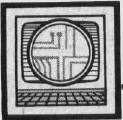
Microscope
Sheldon Leemon
Go Directly To Jail
MonopolyTM is one of the most popular board games ever produced, so it should come as no surprise to anyone that it's one of the most popular computer games as well. In the last few years, versions have been written for the Commodore 64, Atari 800, IBM PC, Macintosh, Atari ST, and Amiga. Although none of these programs are sold commercially, they have been widely distributed by information services, BBS's, user groups, and public domain software copying services.
What most computer owners don't realize is that as open and widespread as the distribution of these programs has been, it happens to be illegal. Most people assume that if there were a legal problem, Parker Brothers, the company which holds the trademark and copyright for MonopolyTM, would have complained.
As it turns out, the company has been completely unaware of what was going on. It was not until a user named David Addison made and distributed a particularly detailed version of the game on the Amiga that Parker Brothers became aware of the problem. This program contained the phrase "A Parker Brother game" on its title screen, which apparently made someone think that Parker Brothers might be interested. They were not only interested, but appalled to learn how many computer versions were being circulated.
Parker Brothers has since mounted a vigorous campaign to remove these programs from circulation. It's going to be an uphill battle, however, considering the number of users who are distributing these programs to their friends.
Patents, Copyrights, And Trademarks
Since a large segment of the population never uses computers, it's not really surprising that the board game manufacturer didn't find out until now. What is surprising is that the computer community, which usually tries to police itself in such matters, didn't catch on earlier. With the large number of "look and feel" lawsuits going on, distributers of public domain software have become careful to screen out programs that too closely mimic popular commercial video games. Apparently, they aren't quite so sensitive when it comes to the legal perils of appropriating other types of intellectual property via computer.
Some of the confusion may stem from the fact that the laws protecting intellectual property are numerous and complex. The idea for a board game like MonopolyTM can be protected by a patent. This excludes anyone else from marketing a game with the same object, style of play, and so on. In addition, the expression of that game idea is protected by copyright for a term of 75 years. The game's expression includes the graphics used for the game board and card, the shapes of the playing pieces, and the text of the instructions.
Even after the copyright expires, Parker Brothers will still be protected by trademark law. This law is designed to prevent a company from confusing the public into thinking that its product is actually that of another, more famous company.
The most obvious violation is using another company's brand name, like MonopolyTM, for your program. But a distinctive graphic design or logo can also constitute a trademark, and thus trademark law can protect a graphic long after the copyright has expired. For example, it would be silly to expect that everybody will be able to use the Mickey Mouse character after the copyright expires. That character has become so strongly associated with Disney that using Mickey in your advertising would be unfair. It would suggest that your product is in some way associated with Disney. The same law applies to the distinctive elements of the MonopolyTM game, like the locomotive, or the little man with the mustache. The fact that you're giving the game away, rather than selling it, doesn't make it any more legal.
The Moral Of The Story
The lesson here is that you have to be very careful when creating computer counterparts of existing games. A few games, like backgammon, chess and checkers, are ancient in origin, and are best known by a name which is in common usage and cannot be trademarked. Such games can be freely implemented on the computer. Other games which are ancient in origin are best known by names that are the trademark of the present-day companies that manufacture them. For example, the ancient Indian board game pachisi is known by the trademarked name ParchisiTM. So, while it's okay to program computer versions of pachisi, yacht, or reversi, you must be sure not to call them ParchisiTM, YahtzeeTM, or OthelloTM. With modern games like MonopolyTM you must be more careful.
It would probably be OK to program a game that played by the same rules as MonopolyTM, as long as you didn't use any of the same names, playing pieces, board graphics, or card text, but there's hardly any point in doing so. Computers present the opportunity to create fantastic new games that could never exist in the physical world. Programmers would be better off trying to build the future, rather than recreate the past.